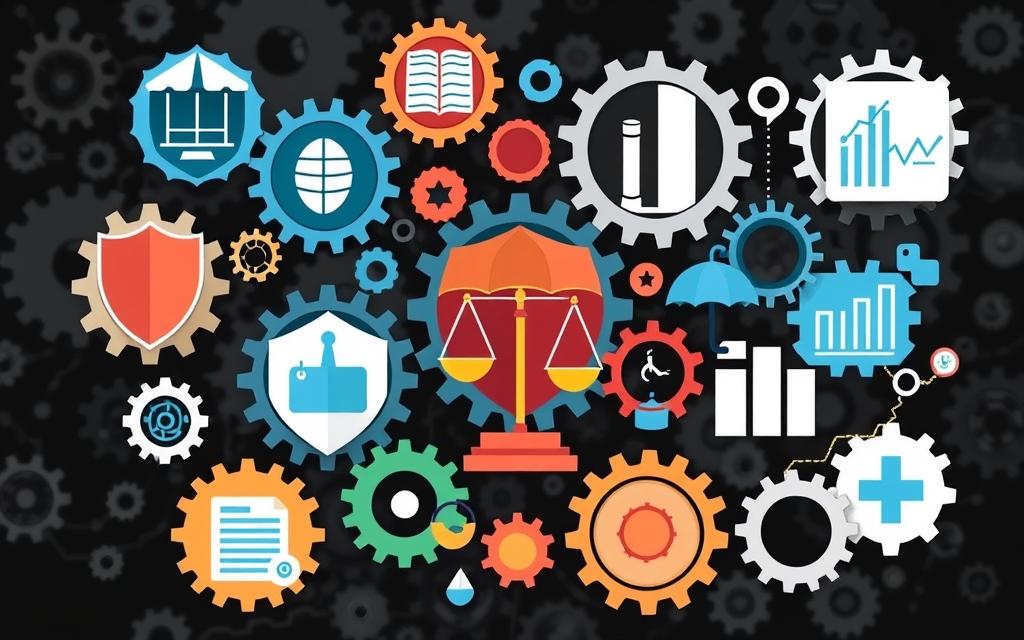Business insurance may sound a little intimidating at first but it is rather important for securing your business operations and assets. This insurance tutorial will give business owners a greater understanding of the coverage that they require, certain industry principles, and suggestions on the best insurance available in Michigan.
After all, as a business owner you come across various adversities which include – risks associated with liability, damage to property, risks to business’s workforce, and calamities of nature. When these risks arise, there are practices known as business insurance that can manage them and offer ways to protect your finances. In this article, we will discuss the important aspects of business insurance, its relevance in your industry, and how to buy business insurance.
Essential Concepts of Business Insurance
Opening a new business can be an exciting yet daunting venture as it comes with its risk factors. However, getting acquainted with business insurance can make one feel intimidated but it is vital for ensuring the safety of the business, the employees and the assets owned. Therefore, knowing how to obtain business insurance is essential as now you can devise suitable ways to protect yourself, right from the beginning itself with appropriate coverage.
Available Coverage’s: Business insurance comes with a lot of coverages, such as general liability, property insurance, workers’ compensation and countless others. So, general liability insurance comes in handy to protect businesses from the exposure of the courts when the company is accused of injuries caused or damage inflicted. Property insurance addresses the risks associated with the organisation’s physical assets, such as structures and machinery. Even workers injured while performing their duties are guaranteed benefits through workers’ compensation.
Mandatory Insurance Cover: Based on one’s locality and occupation, there are some obligations that include having insurance coverage. For instance, nearly all the states require corporations employing workers to take out a Worker’s Liability insurance policy. There are also job types, for example, healthcare or law practitioners who require a specific type of liability cover known as professional malpractice.
Approaches to Risk Management in Enterprises
- Identify potential risks: Look at the unique risks your business possesses such as earthquakes or burglary.
- Analyze the risks in terms of its frequency of occurrence and its effects: Assess each risk and decide how frequent it is and the level of risk posed by it.
- Construct a risk management plan: Develop a policy which will reduce or distribute or take the risk. This might even include taking an insurance cover.
Once more, learning these foundational elements of business insurance enables you to make good, rational decisions on how to ensure that your business has adequate legal protection in addition to having the correct structures in place.
Industry-Specific Insurance Considerations
The other common saying ‘it is all the same general industry insurance coverage applies to businesses‘ in fact does not accurately fit the case. There are some differences in risks and challenges in companies in different industries. Appreciating these critical requirements is very important in insulating the business.
The manufacturing industry can, for instance, seek property insurance that guarantees them against equipment breakdowns. The healthcare industry needs such insurance which is able to protect it against professional liability due to medical malpractice. Technology companies concentrate on policies that will protect them against cyber attacks in the form of cyber liability insurance. Hospitality businesses in particular will want to purchase liquor liability insurance to protect them against damages resulting from the use of alcohol.
- Identify the distinctive perils that are peculiar to your niche
- Look for specific challenges in the industry that can be taken care of through certain specially designed insurances.
- Go through the specific insurance faqs & guides to understand what areas are covered or required in your industry.
- Steer for some time with one of the prominent insurance providers in the market to prepare a suitable business insurance policy.
Willingness to comprehend the requirements of insurance of a particular industry body is most important. This allows business insurance to be adequate and customized according to the requirements. It assists in safeguarding of operations, lowering of business risks and facilitating expansion in the business.
Important Business Insurance Coverage Types
Safeguarding the business is a priority. Three types of insurances shall be highlighted: general liability, professional liability and property insurance.
General Liability Insurance: General liability insurance is a ‘non negotiable’ for all businesses. This type of insurance covers claims against injuries or damage caused to a third party. This policy helps in compensating the expenses incurred in settlements and legal proceedings and helps in preventing loss to the enterprise.
Professional Liability Insurance: Professional liability insurance needs to be held by businesses delivering professional services such as consultancy, accounting etc. It protects against claims of negligence or errors in the services provided. This policy assists in paying for legal costs & any settlements/judgments.
Property Insurance – The Basics
- As the name suggests, this coverage insures a business against losses of any buildings, equipment and inventory used by the business. Survivability in case of losses due to fires, or storms or theft is included in the coverage.
- This policy assists in easing the costs of repair or replacement and helps in keeping your business organized and efficient.
- While selecting property insurance, ensure to evaluate the worth of your assets as well as the risks that are inherent to your business. Also ensure that you have adequate coverage.
| Insurance Type | What It Covers | Key Benefits |
|---|---|---|
| General Liability | Third-party bodily injury or property damage claims | Protects your business from lawsuits and financial losses |
| Professional Liability | Claims of negligence, errors, or omissions in professional services | Covers legal expenses and settlements for service-based businesses |
| Property Insurance | Damage or loss to your business’s physical assets | Helps you recover and continue operations after unexpected events |
Getting these essential insurance policies can shield your business from many risks. It ensures your business can keep going, even when faced with unexpected challenges.
Understanding Your Company’s Profiling Risk
The comprehensive analysis of the risk involved is very important in selecting the correct business insurance cover. This is a technique that assists you in identifying and spotting it. In this way, you would be able to customize the selected insurance policy to meet individual needs. This could also mean saving money since there is a possibility of reducing the amount of insurance to be paid.
To start with, you have to consider the business profiling risk assessment. Here are some of the areas that need to be looked into:
- Understand what the business is and its operations.
- Evaluate the potential threats that may affect each business unit such as litigation, asset loss, and catastrophes.
- Assess the probability and the impact of every risk.
- Identify what level of risk exposure can be tolerated and how best to manage it.
- Determine whether business risk has been fully anticipated in insurance cover.
Completing a proper risk analysis enables you to understand the extent of financial procurement that is necessary in insurance. This will enable clients to avoid contradictions in insurance coverage. This guarantees that the response derived is proportional to the specific risks the enterprise has to deal with.
| Risk Factor | Likelihood | Potential Impact | Mitigation Strategy |
|---|---|---|---|
| Property Damage | Medium | High | Property Insurance, Disaster Preparedness Plan |
| Liability Claims | High | High | General Liability Insurance, Risk Management Protocols |
| Employee Injuries | Medium | Medium | Workers’ Compensation Insurance, Safety Training |
| Cyber Threats | High | High | Cyber Liability Insurance, Cybersecurity Best Practices |
“Identifying and addressing your business risks is the foundation for securing the right insurance coverage. It’s a crucial step in protecting your company’s future.”
Cost Factors and Budget Planning for Insurance
Understanding business insurance can be tricky. But knowing the cost factors and budgeting well can help a lot. The size of your company and the industry you’re in affect your insurance costs. Knowing these can help you make smart choices and protect your business.
Premium Calculation Factors: Insurance costs are based on several things, including:
- Business size and annual revenue
- Industry and associated risk levels
- Claims history and risk profile
- Geographic location and local regulations
- Types of coverage and coverage limits
Ways to Reduce Insurance Costs: While insurance is a must, there are ways to cut costs. Here are some tips:
- Shop around and compare quotes from multiple providers
- Increase deductibles to lower monthly premiums
- Bundle policies to take advantage of package discounts
- Implement risk management practices to reduce claims
- Explore industry-specific programs or associations that offer group rates
Payment Options and Structures: Businesses have different ways to pay for insurance, including:
- Annual lump-sum payments
- Monthly or quarterly installments
- Flexible payment plans to accommodate cash flow
- Automatic electronic payments for convenience
By understanding premium factors, finding ways to save, and choosing the right payment plan, you can budget for insurance. This ensures your business is well-protected.
Comparing Insurance Providers and Policies
When looking for the right business insurance, comparing providers and policies is key. The insurance world is huge, with many providers and products. To choose the best for your business, you must look at what makes each provider and policy different. First, check the financial health and reputation of the providers. Look for those with a solid financial standing and good customer reviews. Their financial ratings and reviews from other businesses can help you understand their reliability.
Then, look at the policy terms and coverage limits. Make sure the coverage fits your business’s specific risks and needs. Be aware of any exclusions, deductibles, and limitations that could leave your business unprotected.
- Assess the provider’s customer service and claims handling. Quick and efficient claims processing is crucial when you need to file a claim.
- Consider the policy’s cost, including premiums, deductibles, and fees. While cost is important, finding a balance between coverage and affordability is key.
- See if the provider can customize policies for your business. Customizable coverage can be very valuable in protecting your business.
By comparing insurance providers and policies, you can make a smart choice for your business. Take the time to explore your options and find the right insurance partner for your company’s future.

Business Insurance Gaps Hampering Your Business
As a business proprietor, make it a point that your firm is well insured in all aspects. But, such practical mitigating factors often go unnoticed which in the long run could save such businesses from grave financial implications. Understanding and addressing these gaps at an early stage is essential for the assets of your business.
Sector-Specific Insurance Gaps: All sectors are prone to their unique set of hazards. Such perils should be taken in the form of insurance coverage as well. For example, a professional firm may require higher limits of liability per the activities it is performing. Whereas a manufacturer might require more coverage of its products. Hence it is very important to understand what aspects are gaps in coverage in the business sector you operate in.
Additional Coverage Possibilities.
- Insurance for Data breaches and Cyber Liability attacks.
- Business Errors and Omissions Insurance.
- EPLI or Employment Liability Insurance for employee disputes.
- Umbrella or Excess Liability coverage for higher liability coverage.
Exclusions in the Insurance Policy you need to be aware of: Most insurance policies have a range of exclusions which are certain risks that can either be limited or completely excluded. In this regard, you need to take note of derogations that have to do with earthquakes, acts of terrorism and deliberate acts. Checking your policy closely enables you to identify and remedy these weaknesses. Moreover, being aware of regular insurance weaknesses and taking measures to cover them helps avoid unnecessary risks. It is always advisable to review and determine whether the insurance that one has still meets ones requirements. This aids in maintaining business risk management strategy intact and effective.
How to articulate the terms and conditions and further details of business insurance.
In view of the many changes that take place in the market, it has become apparent that effective updating of business insurance is of significant consequence. The more a corporation expands the more insurance it requires. One must be up to date with latest developments and shifts in regulations of insurance to be aware of when to revise business insurance.
Evaluate Your Current Coverage: Let us start with your present insurance review policies and its effectiveness into your business. Consider the following:
- Changes in Your Business Operations or in the Industry.
- Changes to the number of employees in your company
- Acquisition of new assets or equipment
- Changes to the goods or services offered
Identify Potential Coverage Gaps: Consider the possibility of obtaining additional or alternative coverage because of the expansion of your business. Seek in your travel insurance and against business exposures for deficiencies. These deficiencies are potential threats to the company.
Explore Supplemental Coverage Options: Once you have reviewed and updated your risk profile, contemplate on the need for your company to have more policies. It may be that your industry requires certain insurance because of exposure to risks or emphasis on property coverage more than what is required. Numerous possibilities exist. Regular assessment and updating of your business insurance ensures that as your business expands, you are already protected. Such an active measure will relieve you of some stress and enable you to protect the success of your enterprise.
Collaborating with insurance brokers and agents
Business insurance can be challenging. However, engaging with professional insurance brokers and agents can go a long way in mitigating the difficulties. The majority have considerable knowledge of numerous types of insurance and can help you locate the best coverage for your company. Such professionals can be of assistance in numerous ways. They can work out how much coverage is required, which policies are available and what the rates are. They also provide periodic assistance to maintain proper coverage levels for a client’s ever-evolving business.
Working together with an insurance broker or agent gives you a lot of industry experience. You will see a wide range of business insurance articles, a guide on insurance, questions and answers on insurance, and many other insurance brokers focusing on the particulars of your industry. With this collaboration, you are enabled to make wise decisions, manage your risks effectively, and also safeguard your business properly.
FAQ
First of all, what types of business insurance coverages are critically important?
The three main types of insurance business coverage are general liability insurance, professional liability insurance, and property insurance coverage. Workers’ compensation and commercial auto insurance are likewise important. How much of the coverage you will need will depend on your line of business and your industry.
What are the minimum and most common insurance terms that are required by the law?
Many states may also require commercial auto insurance policies and workers’ compensation policies. General liability and property insurance coverage may also be required depending on your location and the activities carried out by your business.
What is the first step in risk management?
The first step in this method is to conduct a risk assessment. Risk assessment identifies the dangers and vulnerabilities which stand a chance of occurring. It allows you to decide what insurance is needed and how much of it.
What are the areas where businesses should focus while choosing, if at all, their insurance cover?
There are some businesses which are likely to incur specific risks. For instance, there is a need for a professional insurance in healthcare business, a cyber insurance in technology companies and a liquor insurance in bar businesses. It is important to understand the risks that exist in your industry when choosing an insurance cover.
As a business owner what ways would you suggest for someone looking to minimize cost of business insurance.?
Some of them include having high deductibles, consolidation of policies , and not having a record of making several claims. Also, try to take advantage of the discounts offered by insurers and make a point of checking your insurance cover and its scope so that you don’t pay excessively on premiums.
With so many policies on the market, how can I learn about the more uncommon ones that might exist?
Gaps which are commonly found are low liability coverage, gaps for specific risks like cyber attacks, and lack of coverage for specific industry risks. Always look for these risks and gaps in your cover.
Frequency for conducting a business insurance review?
Conduct an annual review of your cover or when the business experiences a material change. This ensures that the necessary changes are made in time for any gaps that may have arisen.
What makes it preferable to hire an insurance broker or an agent to represent you?
There is always help in finding the best insurance for you, negotiating prices, or providing you assistance in the long run. They can also identify and resolve coverage gaps.







